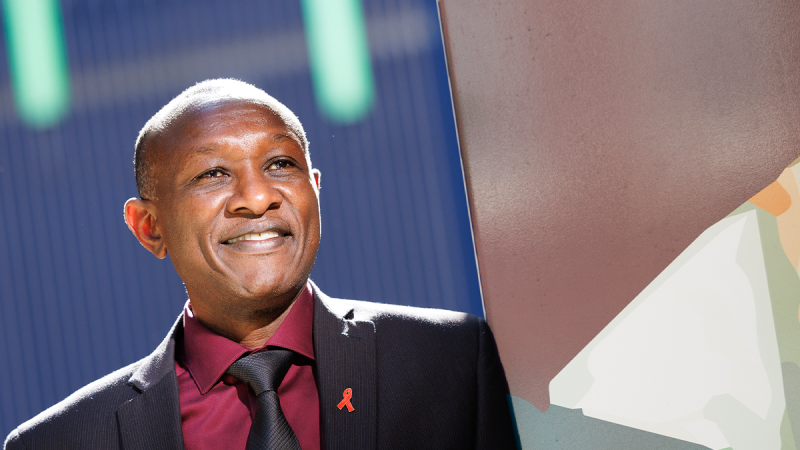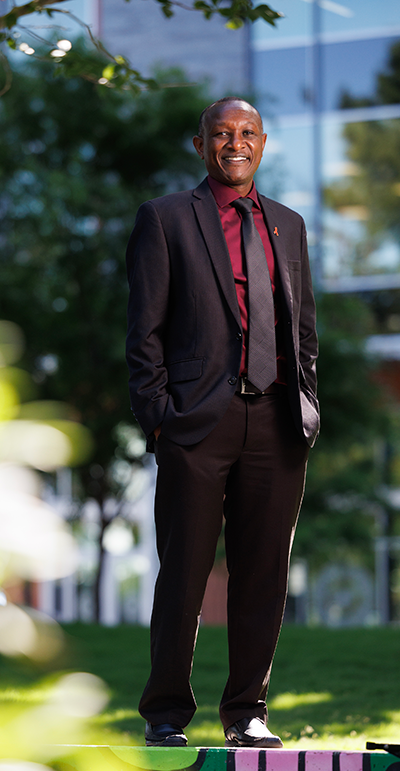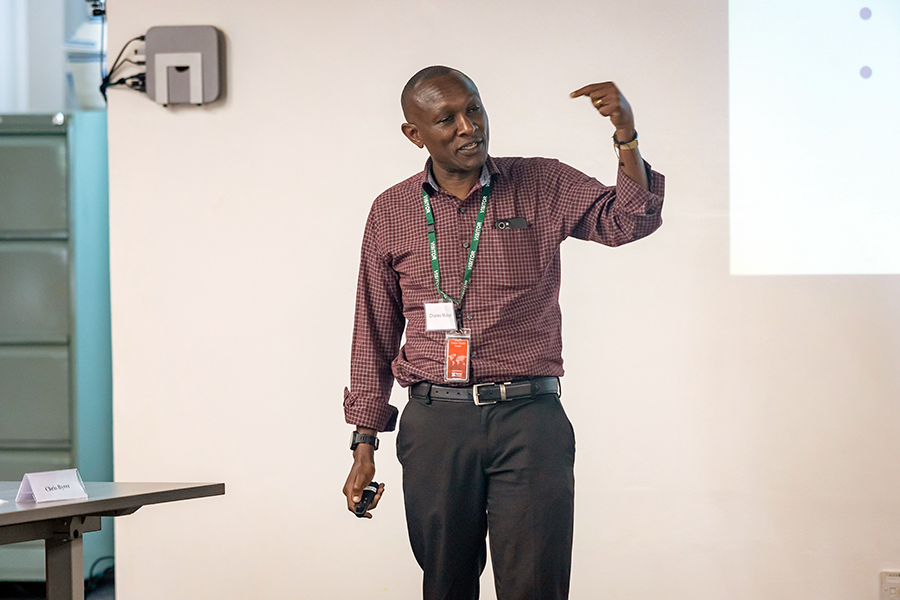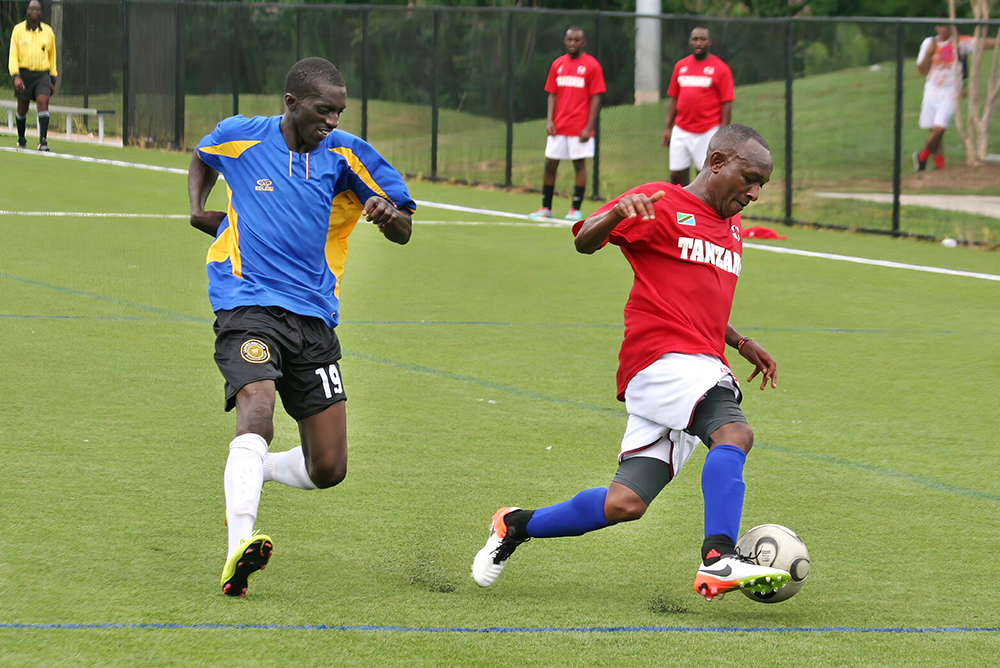
From Nairobi to Duke: How Soccer Helps Researcher Build Bridges in Global Health
Charles Muiruri, PhD, MPH, a faculty member in the Duke University School of Medicine with dual roles in global health and population health, is on a mission to revolutionize care for those juggling multiple chronic health conditions.
But when he moved to Durham, N.C., in 2002, health research was not part of his plan.
For years, the former soccer star and graduate from the University of Nairobi used his winning mix of drive, practice, perseverance, teamwork, and communication skills to run a successful information technology company in Kenya’s capital. Arriving in the United States through the Diversity Immigrant Visa Program (the green card lottery), he intended to further his career in IT.
Instead, Muiruri transitioned to academia, where he helped to build bridges between Duke and the Kilimanjaro Christian Medical University College (KCMC) in Moshi, Tanzania.

He’s produced more than 50 peer-reviewed research articles and been awarded a host of research and training grants, including funding from the National Institutes of Health (NIH) to improve the quality of care for people with HIV who have cardiovascular diseases.
“I think about people living with multiple chronic conditions as if they are actually in the stock market trading a portfolio of stocks — diseases, medications, their daily lives among competing factors,” said Muiruri, an assistant professor in the Duke Department of Population Health Sciences and assistant research professor of global health.
It’s important to understand the ways that patients weigh the benefits, such as quality of life and longevity, against risks of treatments, such as the costs and side effects, he said.
Knowing each person’s preferences and goals and how they prioritize their choices can lead to better, more patient-centered care.
From Baker to Banker to Research Coordinator
When Muiruri arrived in Durham, he wanted to build on his IT experience and eventually study computer science. But first he had to get settled into his new country, “which was very different than what I’d seen on TV in Kenya.”
Like other immigrants, Muiruri started with what he could find. His first job in Durham was as part-time baker in a Kroger grocery store. Then, he passed on an offer to drive a soda delivery truck and instead took a job working as a teller in the Wachovia Bank branch inside the Duke Clinic, also known as Duke South.

One of his customers was John Bartlett, MD, a professor of medicine and global health researcher.
“Charles had a charm and an effervescent personality that absolutely befriended him to every customer who came into that bank,” said Bartlett, who became Muiruri’s friend, mentor and collaborator.
Bartlett and his colleagues in the Department of Medicine’s Division of Infectious Diseases visited the branch to do their personal banking, but they also realized they could tap Muiruri’s knowledge about how to transfer and manage money in East Africa, where they were beginning to build a research program to study HIV.
Bartlett told Muiruri about the HIV work Duke was doing in Tanzania, and he asked Muiruri to read one of the study protocols and assess how well it was translated into Swahili.
“I studied it,” said Muiruri. “I didn’t think they were doing a great job in asking their study questions, so I gave them feedback. They appreciated my contributions, and they recruited me to their growing research enterprise.”
Bartlett and his colleagues had just received an award from the National Institute of Allergy and Infectious Diseases to study AIDS-associated co-infections. They needed a research coordinator to support Duke’s partnership with KCMC in Tanzania.
“I elected to hire Charles despite the fact that he didn’t have any research administrative experience, based upon his history in East Africa, his knowledge of Swahili, his knowledge of East African financial issues, and his knowledge of some of the potential pitfalls in that context,” Bartlett said.
From a Job to a Career
Muiruri thrived in this new role.
Over the next decade, the Duke team received more NIH funding, and their research program and partnership with KCMC and other partners expanded. Muiruri’s curiosity — about research design, data analysis, and the clinical questions the research was asking — also grew.
He ditched his computer science plans and instead earned a Master of Public Health at the University of North Carolina at Chapel Hill while continuing to work his Duke job, then kept going for his PhD in health policy and management. He joined the Duke Department of Population Health Sciences in 2019.
“As a researcher, it is important that you embed into the community of people who get to benefit from your research.”
- Charles Muiruri, PhD, MPH
His first research grant was a diversity supplement under a U01 grant from the National Heart, Lung and Blood Institute (NHLBI) to investigate medication non-adherence for cardiovascular disease among people living with HIV. He’s received a microgrant from the Duke Center for AIDS Research, a career development award from Duke’s REACH Equity program, and a K01 career development award from NHLBI. He is also a co-investigator in other externally funded opportunities.
There’s More to Medicine than Medicine
Fascinated with patient centeredness as a research focus, Muiruri looked near and wide for insight.
One day when he was visiting his mother in Kenya, he saw her getting ready to meet her friends. When he suggested that she had forgotten to take her blood pressure medications, she explained that the side effects were a problem. “She said, ‘I don’t want to be miserable.’”
His mom’s approach to her health illustrated that there was more to her treatment than just medication efficacy. “She was managing her life, not managing her hypertension,” he said. Understanding that was an eye-opener, he says, and it spurred him to want to contribute to research that incorporates patients' beliefs and preferences."
“He has an extraordinary ability to move things forward, and he’s an exceptionally talented member of our Duke community,”
- Mary Klotman, MD
“It’s getting closer to the patient, making it patient-centered and trying to figure out how we can use these insights to develop interventions that will be acceptable to our patients,” he said. A patient like his mother, for example, may wish to pay more for medications with different side effects while another person may not. “Just like we can diagnose diseases, can we also have tools to diagnose preferences?”
Another example: how medications are packaged.
In many HIV care and treatment centers, Muiruri observed patients removing HIV medications from the original manufacturer’s packaging (mostly pill bottles) and transferring them to alternative containers. Although he understood this behavior was related to HIV stigma, he wondered about the effect on medication adherence and subsequent viral suppression.
With funding from the Fogarty International Center, Muiruri explored that research question and published his findings that a substantial proportion of patients were repackaging their antiretroviral therapy medications.
Lance Okeke, MD, associate professor of medicine at Duke School of Medicine, has seen Muiruri’s skills of observation up close. “Charles is unique among researchers that I have worked with in that he intrinsically understands the value of the clinician’s perspective in all of his research initiatives,” Okeke said. “He gets it.”

Together, Okeke and Muiruri serve as co-directors of the Health Services Scientific working group in the Duke Center for AIDS Research.
Okeke said Muiruri is an outstanding collaborator because he has a propensity to better refine his vision of health services delivery from the clinician’s perspective. “That helps Charles generate insightful yet clinically relevant research questions and scientific discourse that providers and researchers alike can engage in.”
Mentor and Change Maker
Those skills of observation and awareness helped Muiruri find another way to make a difference.
“I had the pleasure of first meeting Charles in the Kilimanjaro Christina Medical Center and subsequently working with him at Duke,” said Mary Klotman, MD, executive vice president for health affairs at Duke University and dean of the School of Medicine. “He has an extraordinary ability to move things forward, and he’s an exceptionally talented member of our Duke community.”

In his first year on the School of Medicine faculty, Muiruri attended the ADVANCE-UP career development program, where he was paired with Anthony Fuller, MD, associate director for the Division for Global Neurosurgery and Neurology. They realized they shared a passion for mentoring the next generation.
“We were either going to run yet another pathway program or find ways we could make the existing and future learners and programs thrive,” said Muiruri.
They discovered that Duke already had many established programs to foster the education and career development of early learners, but most of those programs existed in silos.
Muiruri and Fuller co-founded the Center for Pathway Programs through the Duke Clinical & Translational Science Institute. The center is developing a platform called YOJO (Your Journey) that will connect the programs into an ecosystem that can better track and mentor learners as they move on and up — “a living learning lab.”
Where’s the Game?
On nearly 100 trips between Tanzania, Kenya, and other places, Muiruri has developed a strategy for establishing relationships and developing cultural humility. At any meeting’s first meal break, he looks across the table and asks, “Is there a place I can play soccer?”
He gets a lead every time.
Playing soccer with new people offers Muiruri a way to create trust and let others see him as more than a researcher from a distant institution.
“As a researcher, it is important that you embed into the community of people who get to benefit from your research. If I’m just sitting in an ivory tower, I’ll be proposing things that don’t make any sense, or maybe they make sense to me, but will never make any sense to others,” he said.

Anton Zuiker is a research communications project manager in the Duke Clinical Research Institute.
